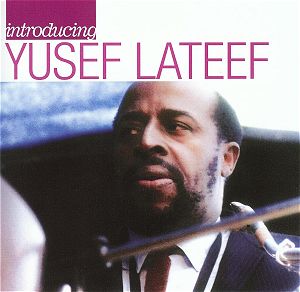Juba Juba
Back Home
Stay With Me
In The Evening
Woodward Avenue
Eastern Market
Russell and Eliot
Buddy and Lou
Nocturne
Live Humble
A Long Time Ago
Nubian Lady
Yusef Lateef (born William
Evans or William Huddleston, I’ve seen both
surnames mentioned, in 1925) was a fine, hard-toned
and swinging tenor player who grew up in Detroit.
He joined Dizzy Gillespie’s Big Band in 1949
and was recording as a leader in 1957. A pioneer
of Eastern music he was also a sometime scorner
of the term "jazz" – he refused to be included
in one of the Feather-Gitler Encyclopedias
of Jazz but they included him anyway,
doubtless to his chagrin. Still, he recanted
often enough to announce that his primary
language was, after all, jazz.
But he was still a pioneer
in his musical horizons and in his choice
of instruments. He was an accomplished flautist
and took on a battery of Eastern instruments
as well – Asian reeds, the argol, shennai
and various oboes, as well as percussion instruments.
He enlarged the palette bringing a sense of
quiet rapture to his music.
This is a compilation album,
with minimal notes and discographic information,
which takes some of his best recordings from
the period 1968-72. They’re derived from albums
such as The Blue Yusef Lateef, Yusef Lateef’s
Detroit, Suite 16 and the Diverse Yusef Lateef.
Fortunately we stop before we get to the period
when he was carried away by his excesses and
began quasi-symphonic noodling.
Juba, Juba is strongly
of its time – blues drenched but with some
hokum as well and a rough chorus eventually
formulating the word "Freedom" in politicised
fashion. Lateef had a fondness for Chicago
style harmonica in his band. This and the
next track, Back Home, derive from
The Blue Yusef Lateef and we can hear how
strongly rooted in the tradition is his tenor
playing whilst his flute adopts a rather more
airy and melodic freedom. He was never as
dynamic or unconventional a multi-instrumentalist
as, say, Rahssan Roland Kirk but his improvisations
did carry with them a remote beauty all their
own. Stay with Me for instance is a
lovely song, beautifully played. And his oboe-sounding
In the Evening, that Leroy Carr standby,
is a down home blues that hits home hard.
By the time of Eastern
Market – nothing to do with the cod exotica
of Albert Ketèlbey – we reach a period
of immersion in such affiliations; terrifically
powerful brass accompanying but in the end
let down by some generic wailing. For all
his world music outreach he was, at heart,
a blues player – witness the electric guitar
solo in Russell and Eliot and the easy
lope of Buddy and Lou. He utilised
the Hammond organ as he did, less successfully
in my book, the vogueish clattering of half
digested Eastern percussion. But listen to
the righteous old time blowing on Live
Humble to appreciate that here was a man
versed in the lineage, aware of his heritage,
and not afraid to call his children home.
Jonathan Woolf
